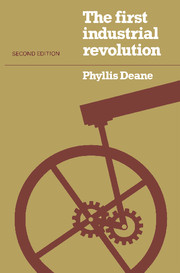Book contents
- Frontmatter
- Contents
- Preface to the first edition
- Preface to the second edition
- 1 The starting-point
- 2 The demographic revolution
- 3 The agricultural revolution
- 4 The commercial revolution
- 5 The transport revolution
- 6 The cotton industry
- 7 The iron industry
- 8 The sources of innovation
- 9 The role of labour
- 10 The role of capital
- 11 The role of the banks
- 12 The adoption of free trade
- 13 The role of government
- 14 Economic growth and economic cycles
- 15 Standards of living
- 16 The achievement
- Guide to further reading
- Subject index
- Index of authors cited
12 - The adoption of free trade
Published online by Cambridge University Press: 04 August 2010
- Frontmatter
- Contents
- Preface to the first edition
- Preface to the second edition
- 1 The starting-point
- 2 The demographic revolution
- 3 The agricultural revolution
- 4 The commercial revolution
- 5 The transport revolution
- 6 The cotton industry
- 7 The iron industry
- 8 The sources of innovation
- 9 The role of labour
- 10 The role of capital
- 11 The role of the banks
- 12 The adoption of free trade
- 13 The role of government
- 14 Economic growth and economic cycles
- 15 Standards of living
- 16 The achievement
- Guide to further reading
- Subject index
- Index of authors cited
Summary
An elaborate system of tariffs designed to protect domestic industry from foreign competion is the hall-mark of a static economy where the major task of commercial policy is to maintain the status quo. Innovation and successful industrialization, however, provide opportunities for expansion and encourage a less restrictive commercial policy. Before the end of the eighteenth century English manufacturers had begun to realize that their interests lay less in the swaddling clothes of Protection than in an opening up of the channels of trade. The Eden Treaty which relaxed some of the tariffs on trade between Britain and France in 1786 was a measure of their growing confidence. Adam Smith's forceful arguments in favour of freer trade were having their influence on the minds of statesmen and policy makers.
The long wars which began in 1793, however, reversed the trend towards Free Trade by introducing a multitude of new uncertainties into the economic situation and by forcing the government to raise revenue-yielding tariffs in the effort to finance the war. The economic uncertainty and the search for government revenue persisted into the post-war aftermath, and although statesmen reared in the doctrines of Adam Smith paid lip-service to a more liberal commercial policy, producers had lost their nerve. ‘The great expansion in agriculture and industry had brought habits and commitments attuned to high prices and profit levels. Faced with difficult and unpleasant readjustments and with reviving European competition the vested interests, new and old alike, felt that they needed stiff duties and prohibitions to keep afloat.’
- Type
- Chapter
- Information
- The First Industrial Revolution , pp. 203 - 218Publisher: Cambridge University PressPrint publication year: 1980



